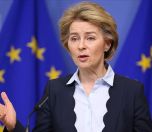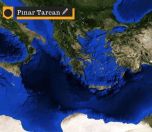* Photo: Anadolu Agency (AA) - Archive
Click to read the article in Turkish
President of Turkey and ruling Justice and Development Party (AKP) Chair Recep Tayyip Erdoğan and Chancellor of Germany Angela Merkel held a video conference yesterday (September 16).
According to a statement released by Turkey's Presidential Directorate of Communications, the relations of Turkey and Germany and regional developments were discussed during the video conference.
President Erdoğan reportedly "stated that disagreements could be resolved by negotiation and reconciliation as long as there was a constructive and equitable approach to the Eastern Mediterranean."
Indicating that European states should be fair and consistent regarding the Eastern Mediterranean issue, President Erdoğan further stressed that "they were determined about the rights of Turkey till the end and they would continue to pursue an active policy."
Turkey's Minister of Foreign Affairs Mevlüt Çavuşoğlu, Minister of National Defense Hulusi Akar, Head of National Intelligence Organization (MİT) Hakan Fidan, Director of Communications Fahrettin Altun, Presidential Spokesperson İbrahim Kalın and Chief of Cabinet to the President Hasan Doğan also attended the meeting on video conference.
Merkel previously called for support to Greece
Most recently, Chancellor Angela Merkel addressed the escalating tensions between Turkey and Greece in the Eastern Mediterranean in her speech during her traditional annual summer news conference on August 28.
Noting that all EU countries had an obligation to support Greece, Merkel reiterated her call for dialogue between Turkey and Greece over the offshore energy exploration in the Eastern Mediterranean.
"I made an effort to reduce tension. Sometimes this is only possible with both parties speaking over and over again," she has said.
"The discussion regarding the distribution of economic zones can only be carried out together. Germany is making an effort for this," she added.
"As EU member states, we all have a duty to take our Greek friends' rights seriously and support them where they are right."
Timeline of the Eastern Mediterranean crisisThe tension between Turkey and Greece over their right to explore energy resources in the Eastern Mediterranean has seriously escalated over the last months. The latest developments leading to this escalation are briefly as follows: On July 21, Turkey issued its first Navtex alert for Oruç Reis seismic vessel's exploration activities in the Eastern Mediterranean. On July 28, Turkey announced after Germany's diplomatic efforts that it suspended hydrocarbon exploration activities and stated that it was ready to talk with Greece. On August 6, Greece and Egypt signed a maritime border agreement. On August 10, Turkey announced that its drillship Oruç Reis would resume energy exploration in the Eastern Mediterranean. It said the ship will continue its work along with the ships Cengiz Han and Ataman until August 23. On August 14, the EU foreign miniters discussed the crisis at an extraordinary meeting, calling on Turkey to end hydrocarbon exploration activities in contested waters. On August 16, Turkey issued a Navtex, announcing that its drill ship Yavuz will continue its work exploring for energy resources off the island of Cyprus. On August 23, Turkey issued another Navtex, stating that the Oruç Reis vessel would continue its activities until August 27. On August 24, Greece held joint naval drills with the US in the south of Crete island. One day later, Turkey conducted naval exercises with Italy. On August 25, Germany's Minister of Foreign Affairs Heiko Maas visited Athens and Ankara to encourage the two countires to have direct talks. On the same day, Turkey held replenishment exercises with Italy in the Eastern Mediterranean. On August 26, US President Donald Trump had phone talks with President Recep Tayyip Erdoğan and Prime Minister of Greece Kyriakos Mitsotakis, urging them to reduce tensions and start dialogue. On the same day, Turkey and the US conducted joint maritime exercises. On August 27 and 28, EU foreign ministers met with the Eastern Mediterranean crisis on the top of their agenda. The Union's foreign polict head Josep Borrell said after the meeting that Turkey's ships might be sanctioned if they continued hydrocarbon activities. Turkey's Ministry of National Defense on August 28 announced that it intercepted six F-16 fighters planes of Greece, which it said were closing in on the area where Turkey issued a Navtex. On September 1, the US lifted the arms embargo on Southern Cyprus. On September 2, Turkey issued two Navtex alerts for Russia's gunnery exercises in the Eastern Mediterranean. It was stated that Russia would conduct exercises in two different areas that correspond to Turkey's hydrocarbon exploration activities on the east and west of the Cyprus island. On September 3, NATO Secretary General Jens Stoltenberg said, "Following my discussions with Greek and Turkish leaders, the two Allies have agreed to enter into technical talks at NATO to establish mechanisms for military deconfliction to reduce the risk of incidents and accidents." On September 4, Prime Minister of Greece Kyriakos Mitsotakis said that Greece would only enter into a dialogue with Turkey if it "stops provocations" in the Eastern Mediterranean. Shortly before this statement, Turkey's Foreign Ministry stated, "Turkey is ready to enter into dialogue with Greece without any preconditions, in order to find lasting, fair and equitable solutions to all outstanding issues between Turkey and Greece." On September 8, the state-run Anadolu Agency (AA) reported that the meeting between military delegations from Turkey and Greece was rescheduled for September 10. On September 10, military delegations from Turkey and Greece had technical talks at NATO headquarters to prevent military engagement. On Septemebr 15, issuing a new NAVTEX alert for the Chios Island of Greece, Turkey argued that Greece had militarized Chios Island in violation of the 1923 Lausanne Peace Treaty. |
(EKN/SD)




.jpg)



